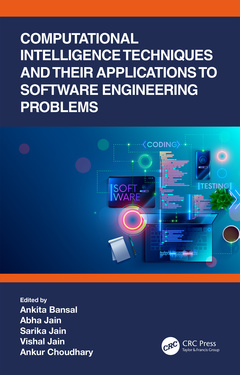Description
Computational Intelligence Techniques and Their Applications to Software Engineering Problems
Computational Intelligence Techniques Series
Coordinators: Bansal Ankita, Jain Abha, Jain Sarika, Jain Vishal, Choudhary Ankur
Language: English
Subjects for Computational Intelligence Techniques and Their...:
Keywords
Computational Intelligence Techniques; Software Development Process; Heuristic and Meta-Heuristic Algorithms; CI; Intelligent Feature Selection; Computational Intelligence; Test Case Optimization; If; Machine Learning; SE Process; Software Design; Agile Methods; Software Reliability; Effort Estimation; software cost estimation; Membership Function; meta-heuristic algorithms; TOPSIS; SDLC Model; software engineering issues; Cot; software requirement prioritization; TOPSIS Methodology; NSGA Ii Algorithm; IFSs; Fuzzy TOPSIS; Tamil Nadu; Fuzzy Decision Matrix; Mars; Real Time Database; Ai Technique; Agile Methodologies; Nonfunctional Requirements; Iris Biometrics; Single Cylinder Compression Ignition Engine
· 15.6x23.4 cm · Hardback
Description
/li>Contents
/li>Biography
/li>
Computational Intelligence Techniques and Their Applications to Software Engineering Problems focuses on computational intelligence approaches as applicable in varied areas of software engineering such as software requirement prioritization, cost estimation, reliability assessment, defect prediction, maintainability and quality prediction, size estimation, vulnerability prediction, test case selection and prioritization, and much more. The concepts of expert systems, case-based reasoning, fuzzy logic, genetic algorithms, swarm computing, and rough sets are introduced with their applications in software engineering. The field of knowledge discovery is explored using neural networks and data mining techniques by determining the underlying and hidden patterns in software data sets. Aimed at graduate students and researchers in computer science engineering, software engineering, information technology, this book:
- Covers various aspects of in-depth solutions of software engineering problems using computational intelligence techniques
- Discusses the latest evolutionary approaches to preliminary theory of different solve optimization problems under software engineering domain
- Covers heuristic as well as meta-heuristic algorithms designed to provide better and optimized solutions
- Illustrates applications including software requirement prioritization, software cost estimation, reliability assessment, software defect prediction, and more
- Highlights swarm intelligence-based optimization solutions for software testing and reliability problems
1. Implementation of Artificial Intelligence Techniques for Improving Software Engineering. 2. Software effort estimation: Machine learning vs. Hybrid algorithms. 3. Implementation of Data Mining Techniques for Software Development Effort Estimation. 4. Empirical Software Measurements with Machine Learning. 5. Project Estimation And Scheduling Using Computational Intelligence. 6. Application of Intuitionistic Fuzzy Similarity Measures in Strategic Decision-Making. 7. Nature-Inspired Approaches to Test Suite Minimization for Regression Testing. 8. Identification and Construction of Reusable Components from Object-Oriented Legacy Systems using various Software Artifacts. 9. A Software Component Evaluation and Selection Approach Using Fuzzy Logic. 10. Smart Predictive Analysis for Testing Messaging-passing Applications. 11. Status of Agile Practices in the Software Industry in 2019. 12. Agile Methodologies: A Performance Analysis To Enhance Software Quality. 13. Pre-Trained Deep Neural Networks for Age Prediction from IRIS Biometrics. 14. Hybrid Intelligent Decision Support Systems to Select The Optimum Fuel Blend in CI Engine. 15. Understanding the Significant Challenges of Software Engineering in Cloud Environment.
Ankita Bansal is an assistant professor at Netaji Subhas University of Technology (NSUT), Delhi, India. Prior to joining NSUT, Dr. Bansal worked as a full-time research scholar at Delhi Technological University (formerly Delhi College of Engineering). She received her master’s and doctoral degrees in computer science from Delhi Technological University (DTU). Her research interests include: software quality, soft computing, database management, machine learning, and meta heuristic models.
Abha Jain is an assistant professor at Shaheed Rajguru College of Applied Sciences for Women, Delhi University, India. Prior to joining the college, she worked as a full-time research scholar and received a doctoral research fellowship from Delhi Technological University. She received her master’s and doctorate degrees in software engineering from DTU. Her research interests include: data mining, software quality, and statistical and machine learning models. She has published papers in international journals and conferences.
Sarika Jain graduated from Jawaharlal Nehru University (India) in 2001. She has served in the field of education for over 19 years and is currently in service at the National Institute of Technology Kurukshetra, India. Dr. Jain has authored/co-authored over 100 publications including books. Her current research interests include: knowledge management and analytics, semantic web, ontological engineering, and intelligent systems. Dr. Jain has supervised two doctorate scholars (five ongoing) who are now pursuing their postdoctorates. She has two research-funded projects: one is ongoing, funded by CRIS TEQUIP-III, and the other is completed, funded by DRDO India. She has also applied for a patent. Dr. Jain has been supervising DAAD interns from different German universities and works in collaboration with various researchers across the globe including: Germany, Austria, Australia, Malaysia, the US
These books may interest you

Evolutionary Optimization Algorithms 123.78 €



